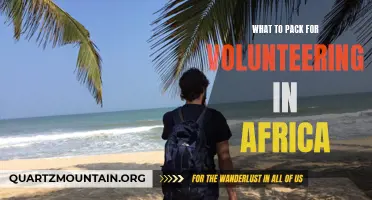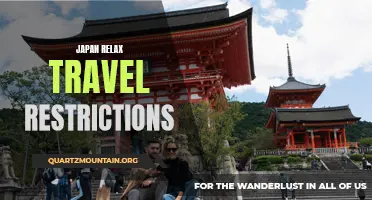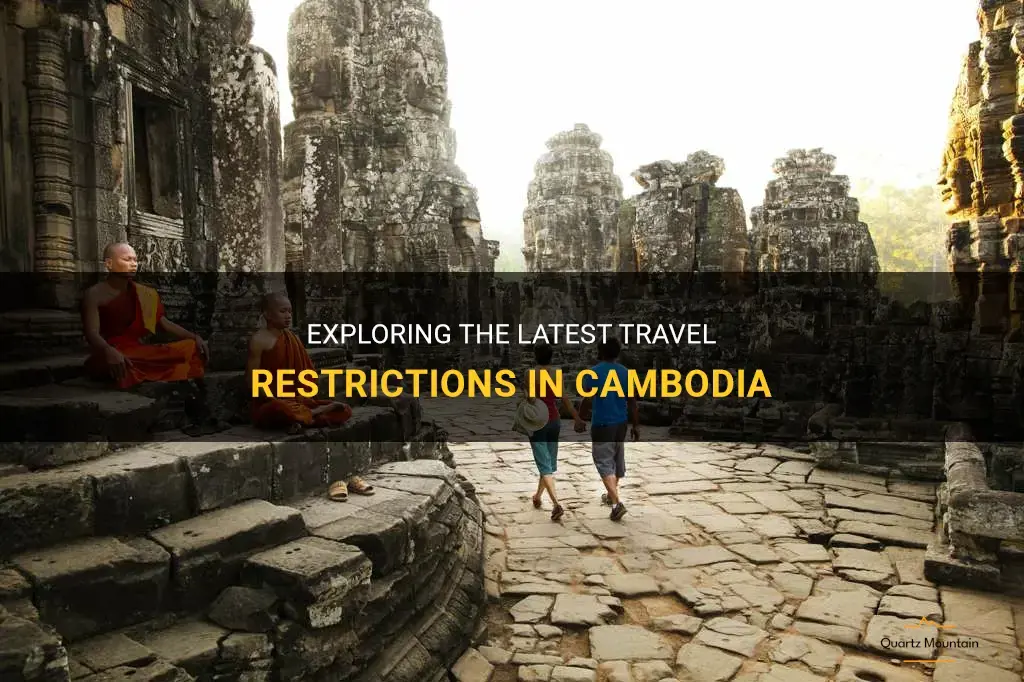
In recent times, the world has experienced unique and unprecedented challenges for travelers due to the widespread impact of the COVID-19 pandemic. One country that has implemented strict travel restrictions to protect its citizens and visitors is Cambodia. These measures have been put in place to maintain public health and safety, as well as to prevent the transmission of the virus. While these restrictions might pose obstacles to travelers' plans, they also offer an opportunity to explore a different side of this beautiful country and discover hidden gems off the beaten path. Join us as we delve into the travel restrictions in Cambodia and uncover the unexpected adventures that await those who venture within its borders.
| Characteristics | Values |
|---|---|
| International travel | Restricted |
| Land borders | Closed except for cargo and emergency cases |
| Sea borders | Closed |
| Airports | Open with limited flights |
| Quaratine required | Yes, 14 days |
| COVID-19 test required | Yes, PCR test within 72 hours before departure |
| Health Declaration Form required | Yes |
| Insurance required | Yes |
| Visa on arrival | Suspended |
| Visa-free travel | Suspended |
| Diplomatic/Official visa | Available |
| E-visa | Available |
| Health insurance required | Yes |
What You'll Learn
- What are the current travel restrictions in Cambodia?
- Are there any specific requirements or documents needed for entry into Cambodia?
- Are there any exceptions to the travel restrictions in Cambodia for certain individuals or groups?
- Are there any quarantine or testing requirements for travelers entering Cambodia?
- Are there any COVID-19 hotspots or high-risk areas in Cambodia where travel is restricted?

What are the current travel restrictions in Cambodia?
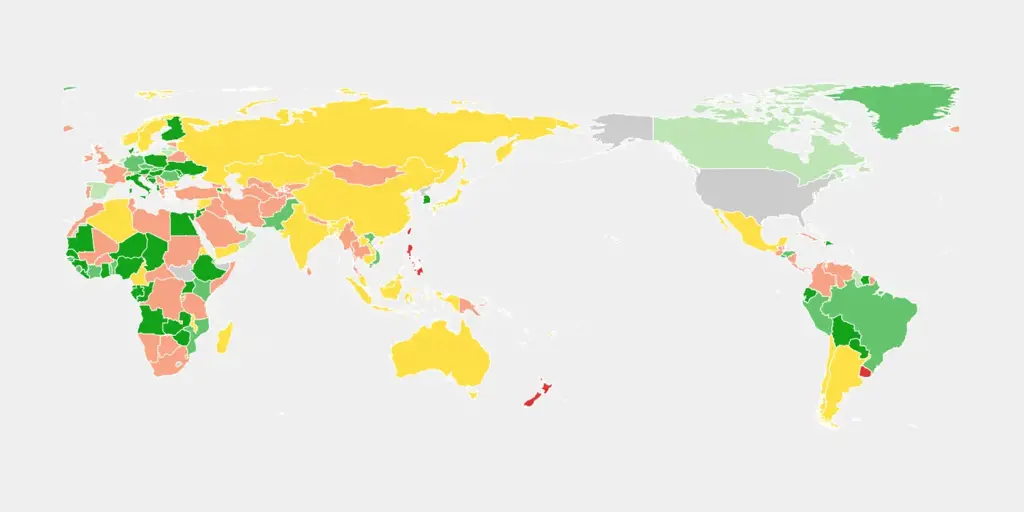
With the ongoing COVID-19 pandemic, travel restrictions have become a necessary measure to control the spread of the virus. Cambodia, like many countries around the world, has implemented various travel restrictions to protect its population and prevent the importation of new cases.
As of now, Cambodia has imposed restrictions on both inbound and outbound travel.
For inbound travel, Cambodia has set up specific requirements for different categories of travelers. These categories include Cambodian citizens, foreign residents, diplomats, official delegations, experts, and technical assistance staff. Each category may have different entry requirements, such as presenting a negative COVID-19 test result, obtaining a visa, or undergoing a mandatory quarantine upon arrival.
For example, Cambodian citizens and foreign residents are required to present a certificate of a negative COVID-19 test result issued no more than 72 hours before the travel date. They are also required to undergo a mandatory 14-day quarantine upon arrival, either at a government facility or a designated hotel.
Foreign diplomats, official delegations, and experts are required to obtain a visa prior to travel and present a COVID-19 health certificate, along with other necessary documents. They are also subject to a mandatory quarantine upon arrival.
As for outbound travel, Cambodian citizens are allowed to travel abroad, but they must follow the guidelines and requirements set by the destination countries. It is important to note that many countries have their own travel restrictions and entry requirements in place, so it is essential to check with the destination country's embassy or consulate before making any travel plans.
It is advisable to keep up-to-date with the latest travel advisories and restrictions imposed by the Cambodian government and other countries. These restrictions are subject to change due to the evolving nature of the pandemic.
In conclusion, Cambodia has implemented various travel restrictions to combat the spread of COVID-19. These restrictions apply to both inbound and outbound travel and vary depending on the traveler's category. It is crucial for individuals to stay informed about the latest travel advisories and requirements set by the Cambodian government and other countries to ensure a smooth and safe travel experience.
The Global Crusade: Countries Enforcing Travel Restrictions on Sex Offenders
You may want to see also

Are there any specific requirements or documents needed for entry into Cambodia?
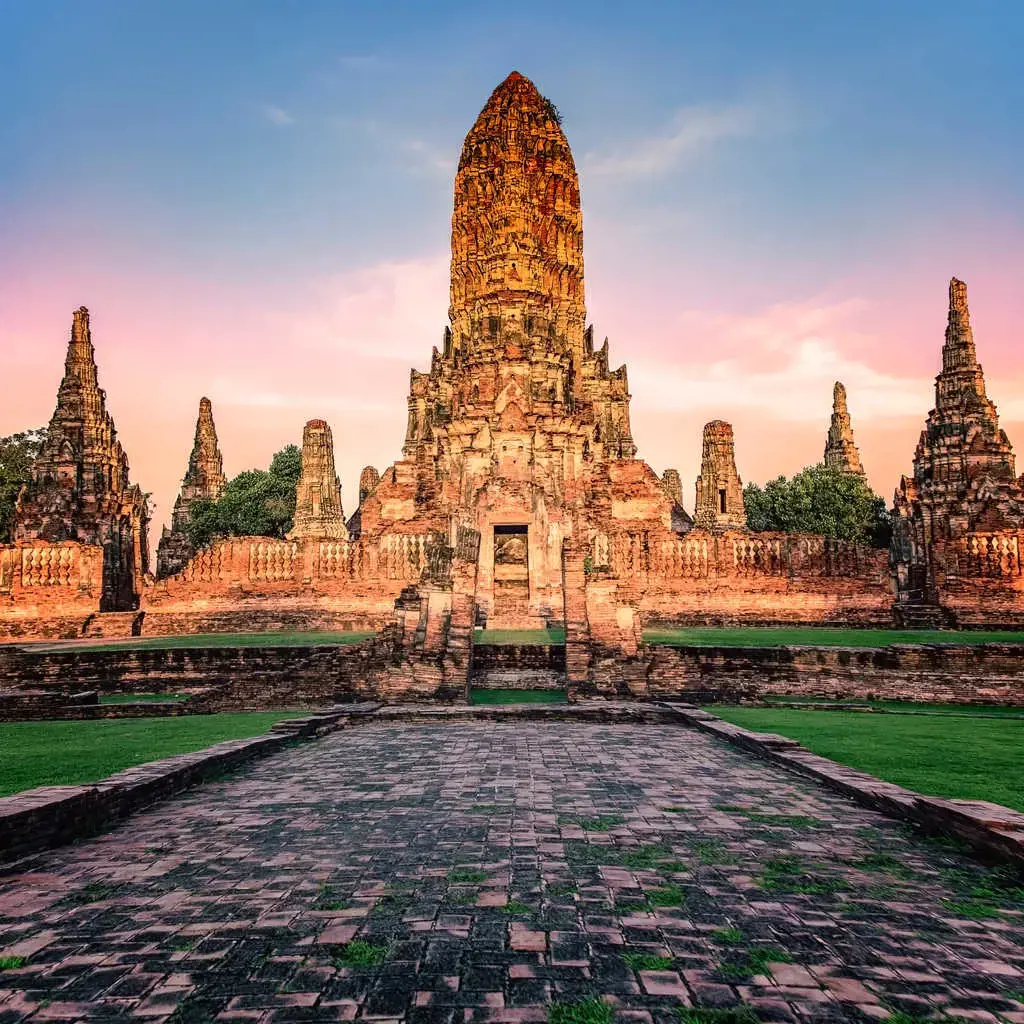
If you are planning a trip to Cambodia, it's essential to familiarize yourself with the entry requirements before you go. Here are the specific requirements and documents you will need to enter the country:
- Passport: All visitors to Cambodia must have a valid passport with at least six months of validity remaining beyond the intended departure date. Make sure your passport is in good condition and has enough blank pages for immigration stamps.
- Visa: Most visitors to Cambodia will require a visa to enter the country. There are three main types of visa available: tourist visa, business visa, and e-visa. The tourist visa is the most common and allows for a stay of up to 30 days. The business visa is required for those who are planning to conduct business activities in Cambodia. The e-visa is an online visa application system that allows for a stay of up to 30 days. It's important to apply for the appropriate visa type based on the purpose of your visit.
- Visa Application: To obtain a visa for Cambodia, you can either apply online, at a Cambodian embassy or consulate, or upon arrival at the airport or border crossing. The visa application generally requires a completed application form, passport-sized photos, a copy of your passport, and the applicable visa fee. It's recommended to check the specific requirements and procedures with the Cambodian embassy or consulate in your home country before you travel.
- Travel Itinerary: It's a good idea to have a copy of your travel itinerary, including your accommodation details, available for immigration officers upon arrival. This can help expedite the entry process and provide reassurance about your planned activities in Cambodia.
- Proof of Sufficient Funds: Immigration officers may ask for proof of sufficient funds to cover your stay in Cambodia. This can be in the form of bank statements, credit cards, or cash. It's advisable to have these documents readily available and easily accessible to present if requested.
- Yellow Fever Certificate (if applicable): If you are traveling from or through a country with a risk of yellow fever transmission, you may be required to present a yellow fever vaccination certificate upon arrival. It's important to check the yellow fever vaccination requirements for Cambodia based on your travel history before you go.
- COVID-19 Requirements: Due to the ongoing COVID-19 pandemic, Cambodia has implemented specific entry requirements, including health screenings, quarantine measures, and COVID-19 testing. It's crucial to stay up to date with the latest information and guidelines provided by the Cambodian government and health authorities.
It's always recommended to check the latest visa and entry requirements for Cambodia before you travel, as they can vary depending on your nationality and the purpose of your visit. Consulting with the Cambodian embassy or consulate in your home country is the best way to ensure you have the correct information and documentation for a smooth entry into the country.
Exploring the Current Travel Restrictions in Thailand Amid COVID-19
You may want to see also

Are there any exceptions to the travel restrictions in Cambodia for certain individuals or groups?
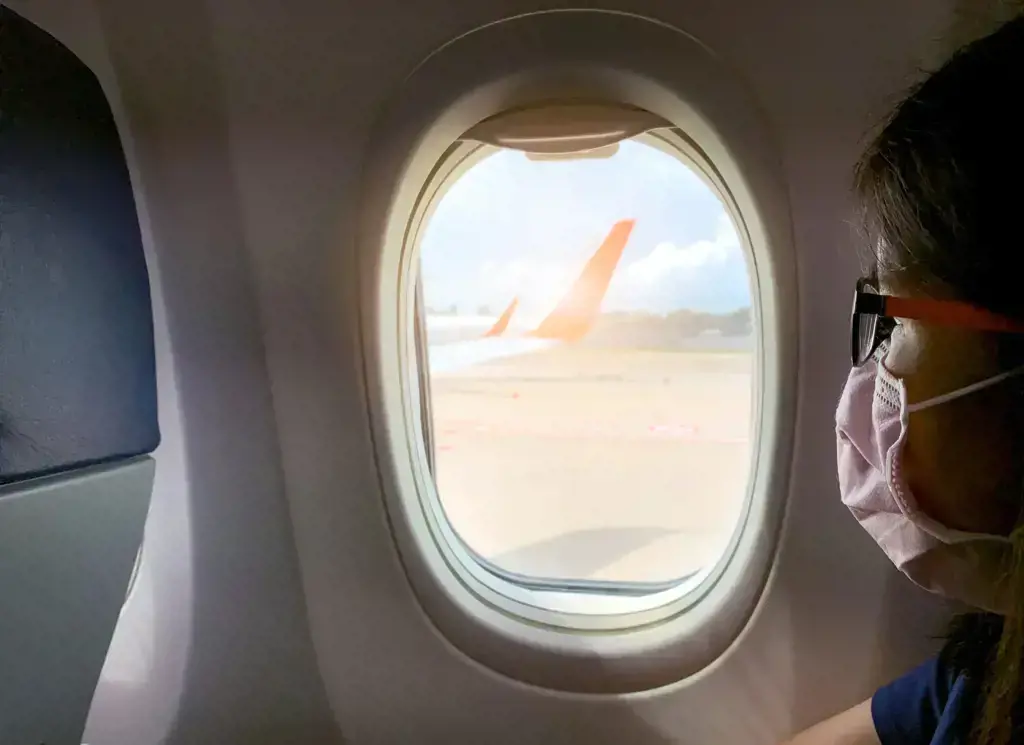
Cambodia, like many other countries, has implemented travel restrictions in response to the COVID-19 pandemic. These restrictions are aimed at preventing the spread of the virus and protecting the health of citizens and residents. However, there are certain exceptions to these travel restrictions for individuals or groups who meet specific criteria.
One such exception is for Cambodian citizens and foreigners with a valid Cambodian visa who are permanent residents in Cambodia. These individuals are allowed to enter the country but must undergo mandatory quarantine upon arrival and follow all health and safety protocols put in place by the government.
Another exception is for diplomats and officials of international organizations who are traveling to Cambodia for official purposes. These individuals are also allowed to enter the country but must follow all necessary health measures and protocols.
Employees of certain sectors such as health, transportation, and logistics may also be exempted from the travel restrictions. These individuals play a crucial role in ensuring the continuity of essential services and are granted permission to travel to and from Cambodia.
In addition to these exceptions, there may be specific cases where individuals or groups are granted special permission to travel to Cambodia. These cases are typically assessed on a case-by-case basis and may involve compelling humanitarian reasons or urgent medical needs.
It is important to note that even individuals who are exempted from the travel restrictions must adhere to strict health and safety protocols. This may include mandatory testing, quarantine, and monitoring upon arrival and throughout their stay in Cambodia.
To apply for an exception to the travel restrictions, individuals or groups must follow the guidelines set by the Cambodian government and submit the necessary documents and information to the relevant authorities. The government will carefully evaluate each case and make a decision based on the circumstances and the risk posed by the individual or group.
In summary, while Cambodia has implemented travel restrictions, there are exceptions for certain individuals or groups. These exceptions include Cambodian citizens and permanent residents, diplomats and officials of international organizations, and employees of essential sectors. Additionally, special permissions may be granted for compelling humanitarian reasons or urgent medical needs. It is important to follow all health and safety protocols and adhere to the guidelines set by the government when applying for an exception to the travel restrictions.
Understanding the Latest Travel Restrictions Imposed by KDHE
You may want to see also

Are there any quarantine or testing requirements for travelers entering Cambodia?
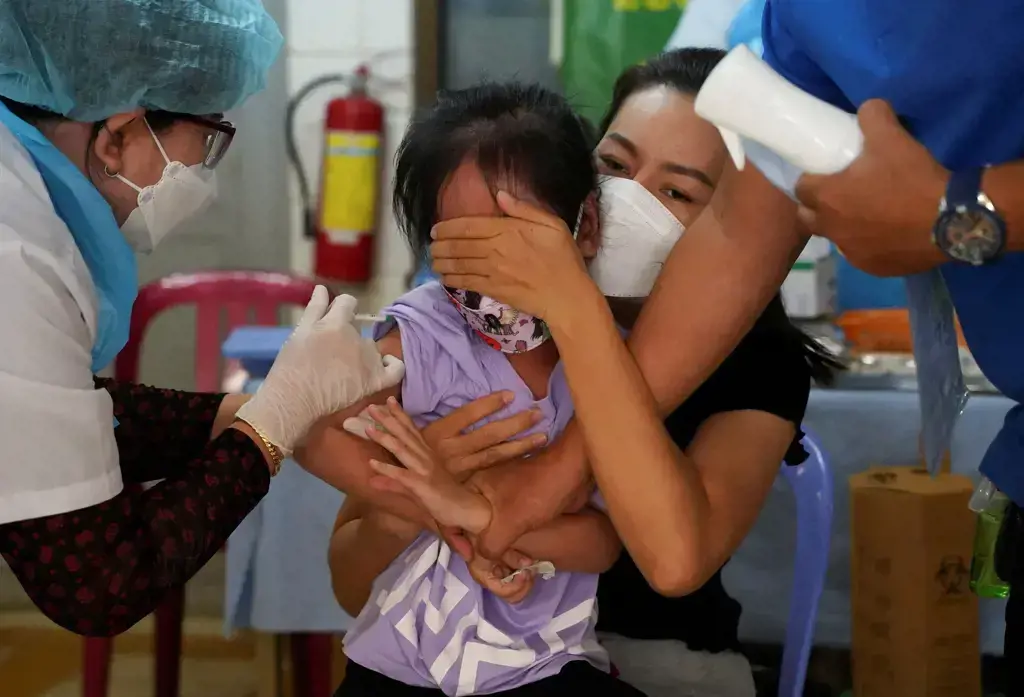
Cambodia has implemented measures to prevent the spread of COVID-19 and protect the health and safety of its citizens and visitors. Travelers entering Cambodia may be subject to quarantine or testing requirements, depending on their country of origin and any recent travel history.
As of now, Cambodia has classified countries into three categories: low-risk countries, medium-risk countries, and high-risk countries. The categorization is based on the prevalence of COVID-19 cases and the effectiveness of each country's response to the pandemic.
Travelers from low-risk countries, which have effectively controlled the spread of COVID-19, are not required to undergo quarantine or testing upon arrival in Cambodia. However, they are still required to follow the local health guidelines, such as practicing good hygiene, wearing masks, and maintaining social distancing.
Travelers from medium-risk countries, where COVID-19 cases are still present but controlled to some extent, are required to undergo a COVID-19 test upon arrival at the airport or the border crossing. They will be asked to wait for the test results at designated facilities, such as a hotel or a government quarantine center. If the test results are negative, they will be allowed to proceed with their travel plans. If the test results are positive, they will be required to undergo treatment and quarantine as per the local health guidelines.
Travelers from high-risk countries, where COVID-19 cases are widespread and the risk of transmission is high, are subject to a mandatory quarantine period of 14 days upon arrival in Cambodia. The quarantine can take place at a designated hotel or government facility. Travelers will be required to bear the expenses of their quarantine and undergo regular COVID-19 testing during the quarantine period. They will only be allowed to leave the quarantine facility if they test negative for COVID-19.
It is important to note that these requirements and guidelines are subject to change depending on the evolving situation of the pandemic. Travelers are advised to regularly check the official websites and announcements of the Ministry of Health and other relevant authorities for the latest information.
Examples of the quarantine and testing requirements can provide a clearer understanding of the process. For instance, a traveler arriving from a low-risk country like New Zealand would not be required to undergo any quarantine or testing upon arrival. They would simply be required to follow the local health guidelines and enjoy their travel in Cambodia.
On the other hand, a traveler arriving from a medium-risk country like Thailand would undergo a COVID-19 test upon arrival. They would then wait for the test results in a designated facility. If the results are negative, they would be allowed to continue their travel plans. However, if the results are positive, they would be required to undergo treatment and quarantine until they recover from the illness.
Finally, a traveler arriving from a high-risk country like the United States would be subject to a 14-day mandatory quarantine upon arrival. They would be required to stay at a designated quarantine facility and undergo regular COVID-19 testing during the quarantine period. Only when they test negative for COVID-19 would they be allowed to leave the facility and continue their travel in Cambodia.
Reviewing Spain and Portugal's Travel Restrictions Amid the Pandemic
You may want to see also

Are there any COVID-19 hotspots or high-risk areas in Cambodia where travel is restricted?
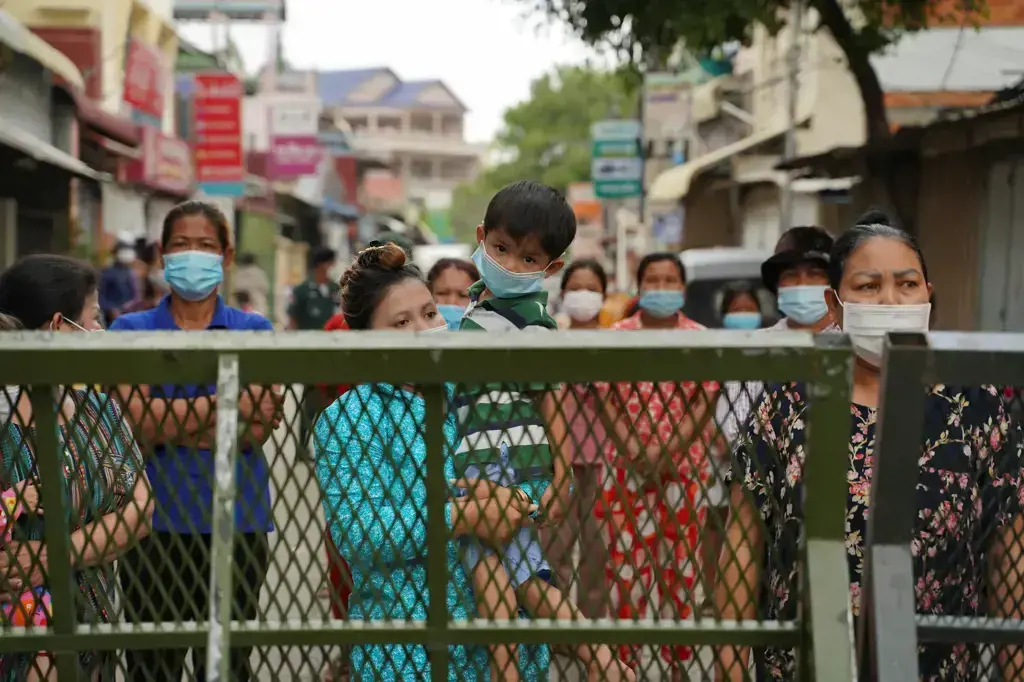
As the COVID-19 pandemic continues to unfold, it is crucial for individuals to stay informed about travel restrictions and high-risk areas to ensure their safety. In Cambodia, while there are no specific travel restrictions in place, there are areas that have been identified as COVID-19 hotspots or high-risk areas.
One of the high-risk areas in Cambodia is Phnom Penh, the capital city. As the most populous city in the country, it naturally poses a higher risk for the spread of the virus. The government has implemented various measures to control the transmission, including the closure of schools and universities, the restriction of non-essential businesses, and the enforcement of social distancing guidelines. Travelers should exercise caution when visiting Phnom Penh and follow all safety protocols advised by local authorities.
Aside from Phnom Penh, other areas that have recorded a higher number of COVID-19 cases include Kandal and Siem Reap provinces. These areas have also implemented strict measures to contain the spread of the virus, such as lockdowns and travel restrictions. It is advisable for individuals to avoid unnecessary travel to these regions and stay updated with the latest news and information from local authorities.
In addition to these high-risk areas, it is crucial for travelers to be aware of the overall COVID-19 situation in Cambodia. The country has implemented measures to control the transmission of the virus, including mandatory quarantine for incoming travelers and regular testing. It is important to check the latest travel advisories and follow all safety guidelines advised by the government and health authorities.
To mitigate the risk of COVID-19 when traveling within Cambodia, it is recommended to practice good hygiene measures, such as frequent handwashing, wearing masks, and maintaining social distancing. Travelers should also avoid crowded areas and gatherings, as these settings can increase the likelihood of transmission.
Furthermore, it is essential to stay informed about the latest updates on COVID-19 in Cambodia. This can be done by regularly checking official government websites, local news sources, and consulting with health professionals or travel agencies. Being aware of the current situation will help individuals make informed decisions and take appropriate precautions.
In conclusion, while there are no strict travel restrictions in Cambodia, there are high-risk areas and COVID-19 hotspots that individuals should be cautious about. Phnom Penh, Kandal, and Siem Reap provinces have recorded higher numbers of COVID-19 cases and have implemented various measures to contain the spread of the virus. Travelers should stay informed about the latest updates and follow all safety guidelines and protocols advised by the government and health authorities. By staying vigilant and taking necessary precautions, individuals can help reduce the risk of COVID-19 transmission while traveling in Cambodia.
Understanding the Impact of Travel Restrictions from CT to NC: What You Need to Know
You may want to see also
Frequently asked questions
Yes, there are currently travel restrictions in place in Cambodia due to the COVID-19 pandemic. The government has implemented various measures to prevent the spread of the virus, including restricting entry for non-Cambodian citizens and requiring mandatory quarantine for any incoming travelers.
It depends on your nationality and the current travel restrictions in place. Non-Cambodian citizens are generally not allowed to enter Cambodia, unless they have a valid visa and meet certain requirements, such as holding a valid work permit or being a spouse or child of a Cambodian citizen. It is advised to check with the Embassy or Consulate of Cambodia in your country for the latest information on travel restrictions.
Yes, all incoming travelers to Cambodia are required to undergo mandatory quarantine upon arrival. The duration of the quarantine may vary depending on your travel history and the country you are arriving from. It is recommended to check with the Cambodian authorities or your airline for the specific quarantine requirements and arrangements before your travel.



